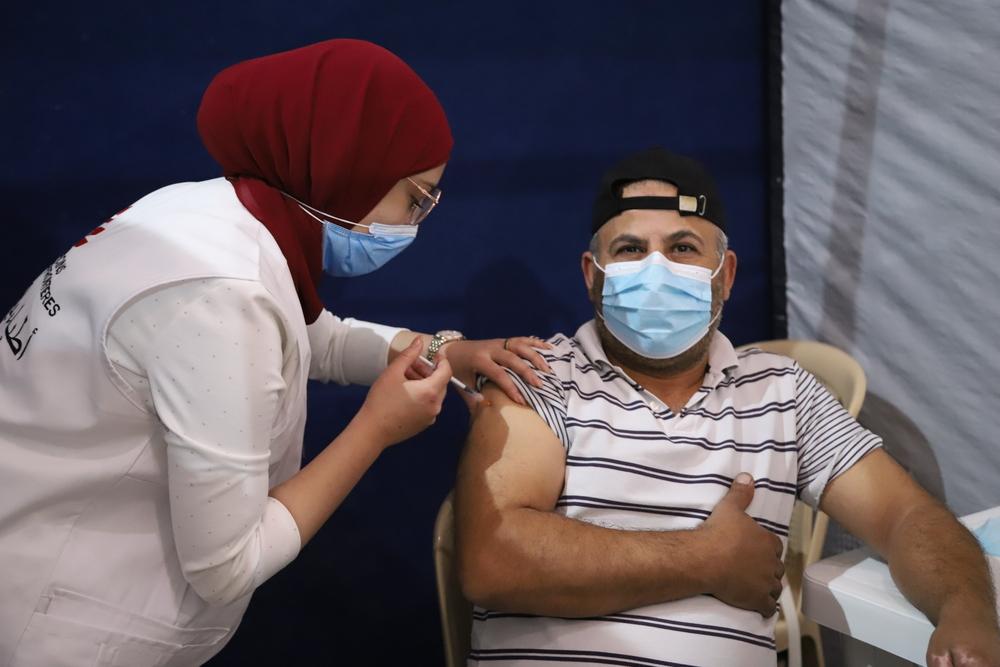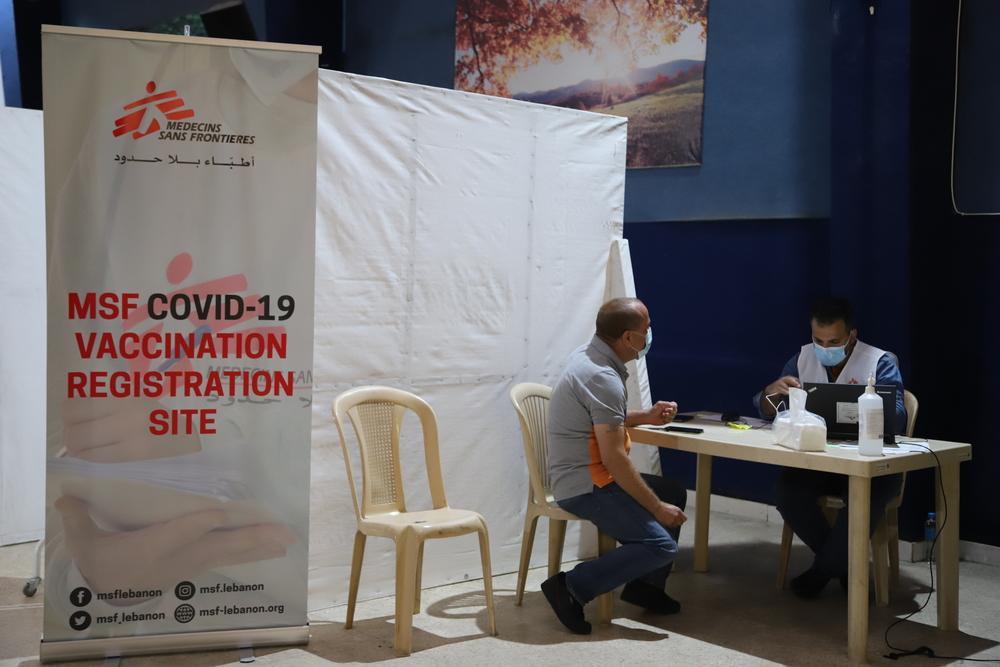North Lebanon: Doctors Without Borders Starts COVID-19 Vaccination in Remote Areas

A man receives a dose of COVID-19 vaccine at the Doctors Without Borders vaccination center in Bar Elias (Bekaa Valley). Lebanon, 2021. © Tracy Makhlouf/MSF
Doctors Without Borders / Médecins Sans Frontières (MSF) is contributing to Lebanon’s vaccination efforts in the remote areas of Wadi Khaled, and Khat El Petrol, within the Akkar governorate (north of Lebanon), following an agreement with the Ministry of Public Health. Doctors Without Borders is deploying a mobile medical team in an effort to accelerate the vaccine distribution and ensure coverage in areas with limited COVID-19 structures set up in the country.
“Lebanon can’t afford any additional shocks from the COVID-19 pandemic and no longer has the same response capacity it had during the previous wave in early 2021,” says Marcelo Fernandez, Doctors Without Borders Head of Mission in Lebanon. “Vaccination is an essential component in the fight against the COVID-19 pandemic, and we are supporting the vaccination roll-out in Lebanon in underserved areas such as Wadi Khaled, and Khat El Petrol.”
Since the launch of the national vaccination rollout in March 2021, barely half of the 3 million people in Lebanon registered to receive their COVID-19 vaccine have been fully vaccinated. In Akkar only around 40,000 people received their second dose.
“The challenge isn’t only linked to the speed of the vaccination distribution. In Lebanon, vaccine hesitancy, in general, is a reality,” says Evelyne Wachira, Doctors Without Borders Project Medical Referent in Akkar. In a country of over 6 million, more than half of the population is still hesitating to get vaccinated, and Akkar governorate makes up only 3.68% of the percentage of people registered to receive the vaccine.
A lot of efforts are invested by our teams in informing the population properly about the vaccine and the process since there is a lot of disinformation and misunderstanding. Health promotion is as essential as the vaccine itself, they go very much hand in hand.Evelyne Wachira, Project Med. Referent
Since the beginning of the pandemic, Doctors Without Borders' health promotion team and other humanitarian and medical actors have conducted daily C-19 awareness campaigns within local communities in Wadi Khaled, and Khat El Petrol to overcome vaccine hesitancy and stress the importance of vaccination as protection from potentially severe COVID-19 complications that would require hospitalizations and even death.
To be eligible for vaccination by Doctors Without Borders, beneficiaries need to be pre-registered on the online platform created by the health authorities. Before vaccinating patients, Doctors Without Borders mobile teams are confirming their pre-registration status as well as their consent. The vaccines are supplied by the health authorities.
“Doctors Without Borders is committed to continuing its support to the Lebanese population in response to the COVID-19 pandemic, which has further exacerbated the country’s already crippled health care system and pushed many people to the brink due to a prolonged and severe economic crisis”, concludes Doctors Without Borders Head of Mission Fernandez.

A man is getting registered to receive his COVID-19 vaccine at the Doctors Without Borders vaccination center in Bar Elias (Bekaa Valley). Lebanon, 2021. © Tracy Makhlouf/MSF
Doctors Without Borders has started administering COVID-19 vaccinations in March 2021 to ensure that some of the country’s most vulnerable and at-risk communities, such as the elderly, health care workers, refugees, and people in detention, would be able to get the vaccine. On top of its mobile vaccination team activities, Doctors Without Borders opened a COVID-19 vaccination center, in Bar Elias town, at the beginning of June to accelerate the access to the COVID-19 vaccine to even more people in Lebanon.
Doctors Without Borders teams also carried out COVID-19 testing and health promotion activities in several locations across Lebanon. In Zahle’s Elias Haraoui public hospital, Doctors Without Borders has supported the COVID-19 ICU ward and expanded its emergency room activities to ensure effective triage of COVID -19 patients between January and March 2021.
Doctors Without Borders first began work in Lebanon in 1976 and has been present in the country without interruption since 2008. Doctors Without Borders is currently providing free medical care for vulnerable communities throughout Lebanon, whether they are Lebanese, refugees or migrant workers. The organization is present in more than 10 different locations across the country. Our services include mental health, sexual and reproductive health, pediatrics, vaccinations, and treatment for non-communicable diseases, such as diabetes. With over 600 staff, Doctors Without Borders conducts around 150,000 medical consultations every year in Lebanon.